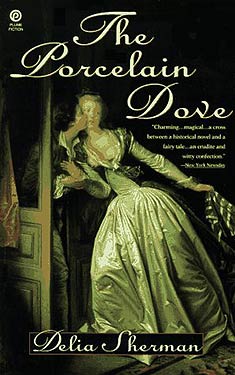Delia Sherman
Completed 10/30/2021, Reviewed 10/30/2021
4 stars
Winner of the Mythopoeic Award in 1994, this book is a tour de force of alternative history and light fantasy. It takes the story of a dysfunctional noble family in eighteenth century France through the Revolution bracketed by a four-hundred-year-old family curse as told through the eyes of a chambermaid. The story is richly conveyed with personal details, history, society, and gossip, so much so that the curse is occasionally lost in the telling. However, the telling is superb. I read Through a Brazen Mirror by Sherman about a year and a half ago and loved it. So I went into this book expecting a lot and I got it.
Berthe Duvet is the chambermaid of Adele du Fourchet, who becomes the Duchess of Malvoeux. The Duke is an obsessed bird collector. When the family curse takes hold, Berthe bears witness as the family descends into madness. After failed attempts by the two sons, the daughter seeks out the so-called porcelain dove to break the curse. Two hundred years later Berthe, living in enchantment, recounts the tale of the Adele, the family, the curse, and French revolution that occurred amidst all the chaos.
Right off the bat, I have to say that the prose and the world-building are simply mind-blowing. Sherman writes beautifully, capturing such detail of the mid to late 18th century that I felt completely immersed in it. Everything, from the clothing to the gossip, is described exquisitely. As I discovered in Brazen Mirror, Sherman is an amazing storyteller. Unfortunately, the detail sidetracks the story of the curse which causes the very slow decline of the family. I felt that the book dragged for about a hundred or so pages. After a while, I just wanted the French Revolution to happen just to liven up things.
Like the world-building, the characters are amazing. There are a lot of them. Besides Berthe and the family of Malvoeux, there are a multitude of other servants as well as Adele’s family, Berthe’s family, the people of Parisian society, and the townspeople of Beauxpres. However, I had no trouble following most of them, except I occasionally got a few of the servants mixed up. They are all vividly drawn and their dialogue very believable. Berthe is the main character, recounting the history of the family. She is wonderfully cynical, yet completely wed to the idea of her station as chambermaid, or femme de chambre. She loves her madame, Adele, and in fact, is somewhat in love with her. Adele is perfect as the flighty society girl who is more focused on herself than she is her children. You get the sense that she too is in love Berthe.
As for the rest of the family, the Duke is aggravating, as are most of his peers. His obsession with his birds takes precedence over his love for his wife and children. Leon, the eldest son is a lecherous cad. He tortures animals and ruins women’s reputations, both of high and low station. Justin, the middle son, is just kind of lost, finding solace in God and the monastery. The daughter, Linotte, seems to have an old soul. She can see people and things for what they are. In addition, she’s a sorceress in training. The children are all basically ignored by their parents and grow up wild and obstinate in their own ways.
I really liked the historical aspect of the novel, particularly, how the French Revolution affects the Malvoeux family in its three-hundred-room mansion far from Paris. Sherman did a lot of research about this time period. She includes a bibliography and references letters and memoirs of the time. I certainly felt I was right there as the peasants of Beauxpres rise up against the Duke.
I give this book four stars out of five. I think you’ll like it if you like this period of French history and are an historical novel buff. If you aren’t, I think you’ll have the same experience I did of it just taking a little too long. Trigger warning, the origins of the curse are very gruesome. It might turn you off, so be forewarned. Overall, I found it a well-crafted novel worthy of the Mythopoeic.

No comments:
Post a Comment